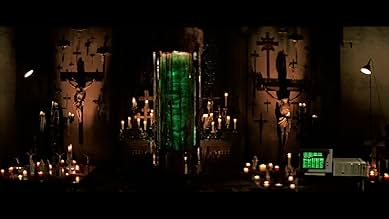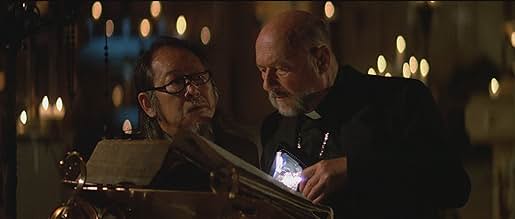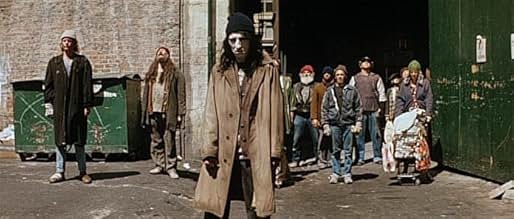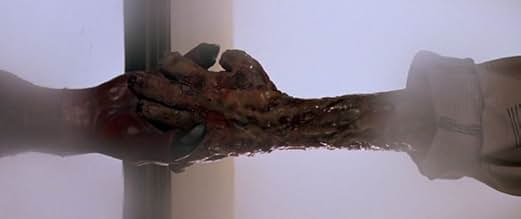Une équipe de chercheurs trouve un mystérieux cylindre dans une église abandonnée. S'il est ouvert, cela pourrait signifier la fin du monde.Une équipe de chercheurs trouve un mystérieux cylindre dans une église abandonnée. S'il est ouvert, cela pourrait signifier la fin du monde.Une équipe de chercheurs trouve un mystérieux cylindre dans une église abandonnée. S'il est ouvert, cela pourrait signifier la fin du monde.
- Réalisation
- Scénario
- Casting principal
- Récompenses
- 1 victoire et 2 nominations au total
- Susan Cabot
- (as Anne Howard)
Avis à la une
Carpenter really struck gold with the script for Prince of Darkness. I find it to be Carpenter's most intelligent and thought-provoking. I love all of the theoretical, scientific and religious discussion in this film. He takes all of these wonderful ideas and forms them into one of the most intriguing story lines the genre has ever seen. It all makes for a very engaging viewing experience, especially if this sort of material fascinates you as much as it does me.
The film is slow-burning, yet intensely unnerving. The overall mood, the creepy street people, the church itself and the eerie occurrences caused by the Anti-God's growing power all make for an unsettling watch. Perhaps the most effective scene in the film for me is Wyndham saying hello in that garbled voice followed by "Pray for death." I also must make mention of the recurring dream projections via tachyons. A brilliant idea that adds an even deeper level to the film's frightening nature. The imagery in these dreams is truly the stuff nightmares are made of!
As far as the cast goes, this is my favorite ensemble in a Carpenter film, even more so than the one we get in The Thing. They all do fine jobs, especially Pleasance and Victor Wong. I love the interaction between these two. I also really enjoy Jameson Parker in the lead, and Dennis Dun is the rare case of comedy relief that actually works. He is amusing, likable, and his antics don't overshadow or ruin the mood that the film has built up.
The atmosphere? Perfect. So is the dread-inducing score, which is an uncanny fit for the material. In the same way that I see Prince of Darkness as Carpenter's best film, the haunting music throughout makes for his best work as a composer. I love the score as much as I love the film itself. The sense of hopeless isolation Carpenter is able to convey despite the church being in L.A. is yet another impressive accomplishment in a film that never fails to impress.
Definitely an underrated classic. Carpenter's wonderful ideas are realized to fascinating effect in the film, and for me, the execution is flawless. It's a rare case when I have nothing bad to say about a movie, but this is one of those instances. The music, the atmosphere, the apocalyptic tone, the marvelous ending... it all works beautifully. It's a gem that Carpenter has never bettered. I'm in the minority regarding that statement, but I'm sticking to it.
After a few films in the studio system, most notably "Big Trouble in Little China," which undeservedly flopped, Carpenter returned to his roots in small budgeted horror/thriller films. The result was this and it could have hardly been better. The infamous eerie music makes an especially profound effect in this film, which admittedly starts slow, but when it takes of it takes all of your nerves with it.
Unlike many horror popular films this film focuses very heavily on conversation. Atmosphere is of course put first, but the dialog is very interesting and makes for a film that is frightening on a thinking level. There are a well timed moments of violence, but it is on a intellectual level where this film scares the crap out of you. Carpenter must have done a good amount of research as the characters try to use various scientific concepts and terms to describe what they are slowly falling victim to. The dialog very heavily resembles H.P. Lovecraft's writing, who was unrelenting in providing the rational and thought-out narration of his protagonist. One can bet that it is this element that made it necessary for this film to be made independently. The shock isn't visceral, but no less effective.
The only downside are a few really goofy moments ("I said a rich doctor!"), but they are ultimately forgivable and are not as sorely out of place as you might think. 8/10
Rated R: horror violence
A Physics Professor and his group (comprising both graduate students and technicians) accept the invitation of a priest to study an organic fluid that a secret (early Christian) book suggests it should not be tempered with since it has been made by the Prince of Darkness. The group also tries to decode this early Christian document as well.
Carpenter attempted to introduce some aspects of theological implications in this movie without 'hitting' at Christianity or other organized religion. His main concern was of metaphysical nature. My guess is that Carpenter's thoughts were as follows: if God exists and sent Christ (with his dualism: both spirit and flesh-human) then wouldn't one expect that anti-God (Evil-Devil) may also try to set foot on earth using a flesh-organic manifestation as well ? Beyond a certain point the film takes on a traditional horror approach but still it has Carpenter's touch with a very unexpected ending.
I also had a personal reason to like more this film having studied Physics as a graduate student and I thought Carpenter did a more than decent job of portraying believable characters. The romance between two of the students was also built convincingly. Donald Pleasence (another favorite actor of Carpenter) was again excellent as the cynical priest. My rating is a 7.5/10 for this film. One of the good Carpenter films.
This is one of the most divisive John Carpenter films, even among his fans. Most people either seem to love it or hate it. I know when I first saw it back in the early '90s I hated it. I thought it didn't make a lick of sense and the male lead was one of the all-time great movie goobers. It left such a bad taste in my mouth that I refused to even try it again until about five years ago. But when I did, my opinion of it changed quite a bit. I'm not saying I'm now part of the "love it" crowd. I still believe it's flawed and has some elements than can only be enjoyed on a tongue-in-cheek basis. But I do like it a lot. I have watched it several times in the last few years and have grown to appreciate it more each time.
Some genuinely creepy moments, nice gross-out effects, and a very tense last 30 minutes that ranks among Carpenter's best work. Also, another terrific Carpenter score. I don't even mind the cheesy relationship between Lisa Blount and Jameson Parker or the terrible lines they both have to say to one another. Little bits of corn are kind of expected with Carpenter. It's part of his style. It's definitely a unique movie. I can't think of anything else quite like it.
Le saviez-vous
- AnecdotesAlice Cooper used the bike impalement trick in his stage shows prior to this movie. The bike he uses was his own personal prop.
- Gaffes(at around 1h 29 mins) After Walter crawls through the hole in the closet with "possessed" Lisa in tow, they're both in the other room with Prof. Birak, all standing up. You can see the obvious doubling of "short Lisa" by a stuntman - she's suddenly much bigger and taller than the two other men.
- Citations
Voice: This is not a dream... not a dream. We are using your brain's electrical system as a receiver. We are unable to transmit through conscious neural interference. You are receiving this broadcast as a dream. We are transmitting from the year one, nine, nine, nine. You are receiving this broadcast in order to alter the events you are seeing. Our technology has not developed a transmitter strong enough to reach your conscious state of awareness, but this is not a dream. You are seeing what is actually occurring for the purpose of causality violation.
- Crédits fousThe opening credits last for nine minutes.
- Versions alternativesTelevision version is slightly reedited, suggesting that all that takes place in the film is just a dream that Jameson Parker's having:
- after the opening credits there a new shot showing Parker's house from the outside (the theatrical version opens with a shot of Parker trying to perform a card trick).
- at the beginning, after Parker watches on TV a program reporting the discovery of a new supernova, the narration goes on talking about the death of a millionaire and the discovery of a religious book in his library
- all mentions of the dead priest, member of the Brotherhood of Sleep who took care of the church where the evil liquid is kept hidden, are deleted;
- during the whole film, there are new inserted sequences showing Parker sleeping/dreaming in his bed
- Bandes originalesPrince of Darkness
Written by Alice Cooper and Kane Roberts
Performed by Alice Cooper
Produced by Michael Wagener
Courtesy of MCA Records
(C) 1987 Ensign Music Corporation, Ezra Music Inc.
Screen Gems Music - EMI Music Inc.
Meilleurs choix
Détails
- Date de sortie
- Pays d’origine
- Site officiel
- Langues
- Aussi connu sous le nom de
- Príncipe de las tinieblas
- Lieux de tournage
- Sociétés de production
- Voir plus de crédits d'entreprise sur IMDbPro
Box-office
- Budget
- 3 000 000 $US (estimé)
- Montant brut aux États-Unis et au Canada
- 14 182 492 $US
- Week-end de sortie aux États-Unis et au Canada
- 4 657 401 $US
- 25 oct. 1987
- Montant brut mondial
- 14 182 579 $US
- Durée1 heure 42 minutes
- Couleur
- Mixage
- Rapport de forme
- 2.35 : 1
Contribuer à cette page



































